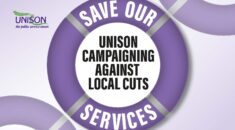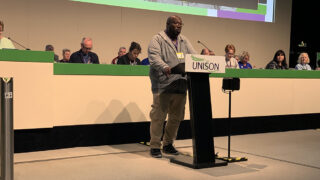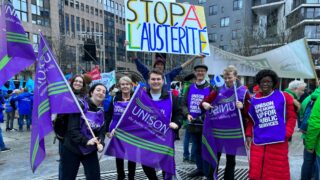UNISON activists from across the country gather in Liverpool this coming week to take part in the union’s national delegate conference.
The conference is the union’s parliament. It’s where representatives elected by UNISON’s members get together to set priorities for the year ahead. And what a year it’s going to be.
Attacks on public services, jobs, pay, terms and conditions, and trade unionism itself – along with rising inequality and an increased squeeze on living standards – mean that what the union does now is more important than ever.
We’re faced by a government determined to cut, and so one of our first aims must be to make the argument for a fair society and an alternative to austerity.
Motion 27 on public services argues that a vital part of this society and this alternative must be publicly-funded and -provided services.
It argues that when David Cameron and his right-wing friends in business and the media say that spending must be cut, we must demonstrate that public services that reflect our values are the best solution to the challenges society faces.
And the debate continues with motion 43. With financial stagnation, high unemployment and underemployment, as well as an estimated one million extra children sinking into poverty, the motion calls for an end to the government’s “self-defeating programme”.
It sets out a plan for a vigorous campaign to turn things around, boosting local economies and confidence through:
- expanding affordable housing;
- creating a state investment bank to back long-term strategic projects ignored by our banks;
- investing in green, affordable and sustainable energy;
- developing a regional economies plan;
- implementing progressive taxation, benefits and tax credits linked to inflation;
- ending the public service pay cap, cuts to services and redundancies;
- introducing a jobs guarantee for the long-term unemployed;
- legislating against zero hours contracts; and
- introducing a living wage.
And as jobs and pay go down, inequality is rising. Average earnings are lagging behind inflation, as food, energy and fuel prices rise, while 13,000 of the country’s super-rich, earning over £1m a year, have been given an average tax cut of £97,884.
Motion 49 sets out to challenge inequality and the squeeze on living standards. Between 1978 and 2011, the share of income that made it through to wage packets fell by over 4%. And the ratio of top executive pay to that of typical employees has increased from 47:1 in 2000, to more than 100:1 today.
This situation is the result of a hollowed-out labour market, a decline in union density and collective bargaining and, above all, the choices of governments that have rewritten the rules of the game to suit those at the top while neglecting their responsibility to develop measures to promote decent jobs and protect the living standards of the many.
The motion seeks to begin to put this right.
The public sector pay freeze has drastically reduced the amount workers have received in recent years, and workers in private companies and the community and voluntary sector have seen pay cuts of up to 30%.
TUC research shows the average worker will lose around £6,000 by 2014 as wages fail to keep pace with rising prices – but for public-sector workers the picture is bleaker still. Reports of in-work poverty are increasing as the majority of people entitled to social security are now in work.
In 2012, UNISON’s welfare fund, There for You, saw a massive rise in applications for grants that fund basic essentials such as school uniforms and heating bills. Applications for help with heating bills went up by a massive 388%, and calls for help with the cost of school uniforms by more than a quarter.
Increasingly, public sector workers are being forced to rely on food banks to feed their families. The Trussell Trust, which runs the UK’s largest network of food banks, estimates that the number of people turning to them for help has risen by 100% in the past year.
In this context, motion 16 on resisting the pay cap calls for priority to be given to a campaign to end the public sector pay cap and for action to promote the living wage as part of a strategy to end the blight of in-work poverty.
Venture capitalist Adrian Beecroft’s report to David Cameron urged the wholesale removal of employment rights in the name of growth. The report is part of the government’s economic strategy that will lead to increased unemployment, underemployment, casualised labour, lower living standards, less equality and more poverty.
Motion 59 salutes the UNISON activists fighting cuts and for employment rights and vows to continue the campaign against the government’s attacks.
None of the union’s objectives can be achieved without a strong and growing union, to be debated in motion 1 on organising.
As general secretary Dave Prentis has said: “UNISON is where it should be. We are at the heart of the campaigns against cuts, against NHS privatisation and in favour of an alternative budget.”
But to keep up our campaigning we need to organise and grow, Mr Prentis continues: “We need to strengthen the union; we need to make sure that the activists are supported and we need to make sure that our members and potential members know that UNISON is there for them.”












